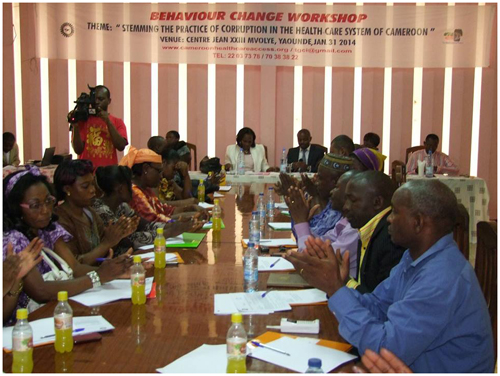
Healthcare may not be thought of as a rule of law issue, but when the right to free healthcare is violated by corruption, counterfeit medicines, or discrimination, innocent people suffer. A seed grant from the World Justice Challenge in 2013 allowed the Cameroon Healthcare Access Program to tackle corruption in the healthcare system, where patients do not receive the free medicines they need and are asked to pay bribes for free services. A recent update from the program shows how the program is raising awareness and advancing the rule of law in Cameroon.
Legally, citizens of Cameroon are granted free testing and treatment for HIV/AIDS, malaria, tuberculosis, cholera, and other infectious diseases. However, some medical staff use extortion to force patients to pay extra for additional testing or send patients to multiple labs for duplicate testing to earn extra money. Others ask patients to purchase drugs outside health facilities, at high prices, that should have been available for free. These corrupt practices can often be life threatening for sick patients.
To counter this culture of corruption, the Cameroon Healthcare Access Program created a national coalition of multidisciplinary stakeholders committed to improving healthcare, especially in disadvantaged communities. The coalition includes government bodies, such as the Ministry of Public Health and the National Anti-Corruption Committee, as well as civil society organizations such as the Global Citizens' Initiative. Together, the coalition members are educating both healthcare employees as well as citizens about the laws regarding healthcare.

Cameroonian civil society members participate in workshop to create community behavior change towards establishing better health practices.
Workshops on healthcare laws, policies and practices are training health workers and focusing on the benefits of corruption-free clinics. The workshops are reaching health workers from multiple medical facilities and include staff ranging from doctors to medical technicians. The program is also educating citizens about their rights to healthcare, and uses public service announcements (PSAs) to teach them how to report violations. Their material was shared on four national television shows in Cameroon as well as radio broadcast. Click the link below to watch the broadcast.
******
Photo Credit:
1) medical center/Cameroon Healthcare
2) workshop/Cameroon Healthcare






